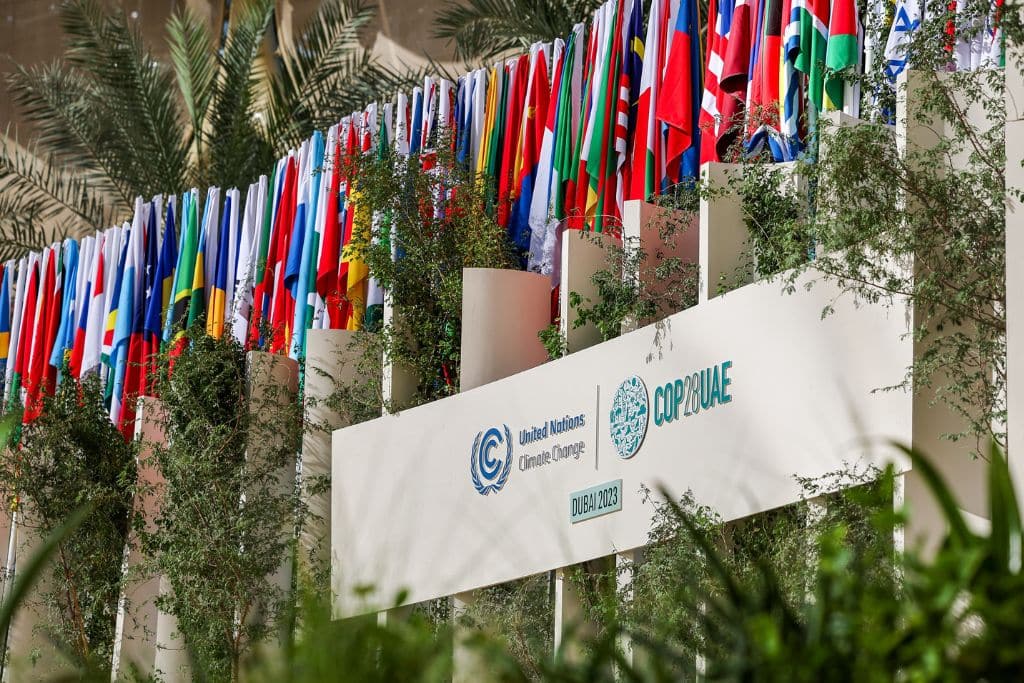Delegates gathering in Dubai on Thursday sealed the agreement on loss and damage, marking a huge step forward on the long-awaited fund set up at last year’s COP27.
—
Delegates gathering in Dubai for the opening day of COP28 on Thursday approved a framework for a fund to help developing countries deal with the harm caused by global warming, with wealthy nations pledging to contribute at least $260 million, surpassing the minimum threshold of $200 million required to initiate operations.
The United Arab Emirates, COP28’s host, and Germany pledged $100 million, respectively. The UK said it would contribute $50 million, Japan $10 million. Later in the day, the European Union came in with $250 million, including Germany’s share, while US climate envoy John Kerry said the Biden administration will provide $17.5 million. Developed countries have also called on high-emitting nations which are not fully developed, such as China and Saudi Arabia, to make contributions to the fund as well.
“After 30 years of effort from developing countries and civil society, it is nothing short of momentous to see the Loss and Damage Fund agreed upon today. It is now essential that developed countries take immediate action to fill the fund with money that is new and additional – not redirected from existing climate finance or development aid,” said Heather McGray, Director of the Climate Justice Resilience Fund (CJRF).
The idea for a Loss and Damage Fund (LDF) emerged from a years-long fight for climate justice as a response to the recognition that climate change disproportionately impacts marginalised communities and exacerbates existing social and economic inequalities. It was formally approved at COP27 in Egypt last year, though progress has been slow ever since.
You might also like: Climate Justice and COP28: Analysing the Progress on the Loss and Damage Fund
The framework agreed upon on Thursday by delegates from nearly 200 countries was approved in early November by the 24-member Transitional Committee (TC), a board set up after COP27 and tasked with the operationalisation of the fund. It contains recommendations on how the fund would operate, including who would get the money, and who would pay.
The final text invites “financial contributions with developed country parties continuing to take this lead to provide financial resources for commencing the operationalisation of the Fund.” It also assures the World Bank as the fund’s host on a four-year interim basis – despite the US pushing to make this permanent. Developing nations initially expressed opposition to the idea of the Bank hosting the Fund due to their lack of confidence in the institution’s significant shift towards promoting climate action.
“We […] expect to see the World Bank deliver on its promise to make funding accessible for sub-national and local organizations,” McGray added. “CJRF’s work with community organizations leading loss and damage responses has clearly shown that putting funding in the hands of communities results in responses that address needs most directly and effectively.”
More on the topic: Explainer: What Is ‘Loss and Damage’ Compensation?
What Can We Expect From COP28?
Delegates gathered at Expo City Dubai on Thursday also approved the agenda for the next two weeks, marking a smooth start to the summit. With an expected attendance of over 70,000 participants, including heads of state, government officials, industry leaders, private sector representatives, academics, experts, youth, and non-state actors, the conference holds immense importance. As set out in the 2015 Paris Climate Agreement, COP28 will also mark a historic milestone by conducting the first Global Stocktake, a comprehensive assessment that will evaluate the progress made by nations towards their climate goals.
Despite an optimistic first day for climate finance, key issues such as nature and biodiversity loss did not receive much attention in the opening plenaries, attendees noted.
“Reflecting on the opening remarks delivered by the UNFCCC today, there was a surprising absence of nature,” said Lucy Almond, Chair of Nature4Climate and Nature Positive Pavilion lead.
“Our natural ecosystems, which underpin our economies, are not just in trouble – they are in a state of crisis. Nature can provide one-third of the solution to climate change and this must be recognised in the Global Stocktake. Yes, it’s a priority for Parties to reduce global carbon emissions, but it is equally as important to halt and reverse nature loss by 2030.”
Featured image: UNclimatechange/Flickr


















